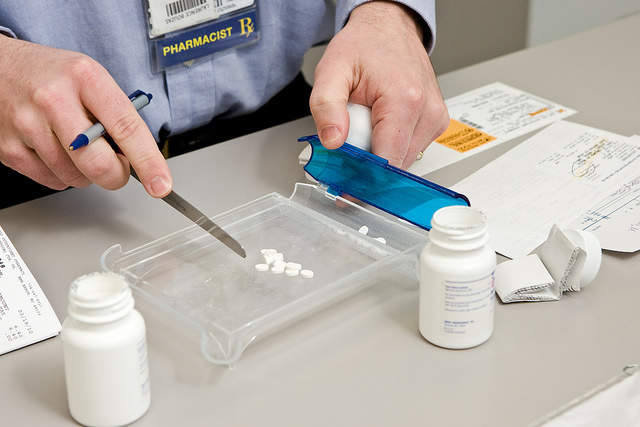The Prescription: Feeling Better

Benefits from having a pharmacist see you during a clinic visit:
- Better pain management
- Better access to affordable medicine
- Improved nausea symptoms
- Reduced costs
- Fewer delays
Pharmacists bring medication expertise to your cancer clinic
We often think of pharmacists as the people behind the counter who dispense the medication we need, but this is only one part of the role of a pharmacist in cancer care. Pharmacists at the University of Michigan Rogel Cancer Center are now also part of each clinic, working day-to-day with your doctors and care team.
"Patients and teams have a point person for anything medication related, from side effects to medication costs to understanding the nuances of the specific drugs and combinations used to treat your illness," says Shannon Hough, Pharm.D., a pharmacist at the Rogel Cancer Center who works with lung cancer patients.
Oncology pharmacists are specially trained and possess a level of expertise on the complicated medications used to treat cancer. Pharmacists in the clinics work with the health care team to make sure the medicines selected for you are as helpful as possible with the least number of side effects.
In addition to adding a layer of support for patients, pharmacists in the clinic review patient cases each day and provide a second set of eyes on infusion orders. They are able to answer questions from physicians and ensure efficient communication with their colleagues in the pharmacy.
"Having a pharmacist in the clinic reduced the wait time in infusion for some patients by 50 percent. If the pharmacy calls the clinic to confirm any details of an order, there is a good chance the physician, NP or PA is already in with another patient. Now the clinical pharmacist clarifies any modifications right away so treatment can begin," Hough says
The goal is to improve outcomes for patients, which might mean something different for each person: better pain management, better access to affordable medicine, improved nausea symptoms, reduced costs, or fewer delays, to name a few.
Hough adds that the complexity of cancer medications is another reason pharmacists make a difference in the clinic. For example, some drugs are better for nerve pain. Others are better for general pain. Pharmacists are knowledgeable about the distinctions between cancer drugs. They ensure patients aren’t prescribed drugs with overlapping side effects or, for example, drugs that increase the risk of bleeding to a patient with low numbers of platelets.
"I love being able to impact the way a patient goes through treatment, either improving their response to treatment or to side effects of treatment," Hough says. "I like my patients to leave the clinic with a plan in place about how to manage their side effects."
If you're having a medication issue, chances are you may see a pharmacist during your next visit to the clinic.
Read the Spring, 2017 issue of Thrive.
